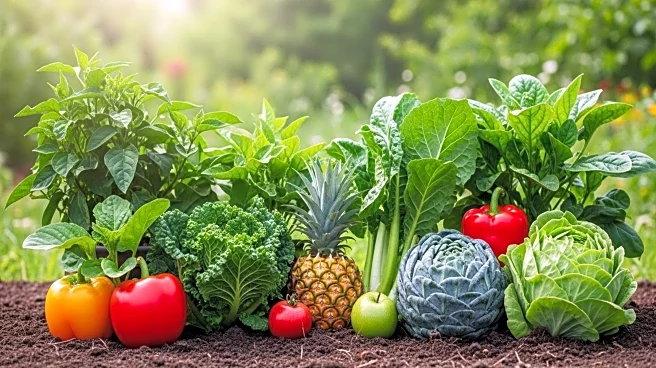What's Happening?
The global organic fertilizers market is expected to grow significantly, reaching USD 38.57 billion by 2033, according to a report by Straits Research. This growth is driven by increasing demand for sustainable agricultural inputs, government initiatives promoting eco-friendly farming, and a consumer shift towards organic food production. Organic fertilizers, derived from plant, animal, and mineral sources, offer benefits such as enhanced soil structure and reduced chemical dependency. The U.S. Department of Agriculture has launched a USD 300 million organic transition program, while Japan aims to expand organic farmland to 2.4 million acres by 2050.
Why It's Important?
The expansion of the organic fertilizers market reflects a global commitment to sustainable agriculture and soil conservation. As consumer awareness of health and environmental sustainability grows, the demand for organic food production increases, influencing market trends. Government support and stricter regulations on synthetic fertilizers are accelerating the adoption of organic alternatives. This shift not only benefits the environment but also supports the agricultural industry by promoting long-term productivity and reducing chemical dependency.
What's Next?
The market is expected to continue its growth trajectory, with technological advancements in bio-fertilizers reshaping the industry. The Asia-Pacific region, particularly India and China, is leading the adoption of sustainable farming practices. Europe is also experiencing growth due to stringent regulations and government efforts to minimize chemical fertilizer use. In North America, the U.S. market is expanding rapidly under strict National Organic Program standards. Key players are innovating to meet the growing need for bio-based and slow-release organic fertilizers.
Beyond the Headlines
The shift towards organic fertilizers has deeper implications for global food systems and ethical farming practices. As awareness of cleaner food systems increases, the expansion of organic acreage reflects a commitment to ethical and sustainable agriculture. Technological advancements in bio-fertilizers are enhancing root strength, water retention, and nutrient absorption, reducing reliance on synthetic fertilizers and promoting environmental preservation.












